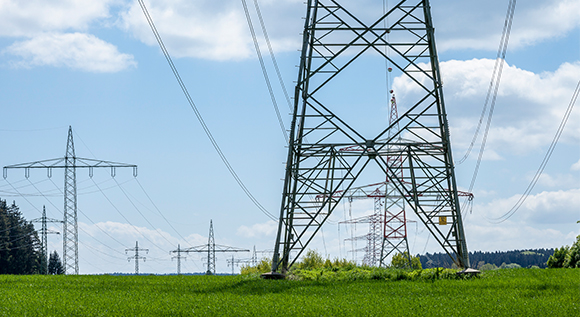New procedures for greater transparency and public acceptance
It is the Achilles' heel of the Energy Transition – and directly affects the public at grass-roots level: the need to extend and expand the power grid. On 25 March 2015, the Federal Government passed a Bill making the planning processes easier to comprehend and extending possibilities for underground routing of power lines.
 © BMWi/ Holger Vonderlind
© BMWi/ Holger Vonderlind
Modern, well-developed power grids are crucial to the success of the Energy Transition. If our energy supply is to remain reliable and affordable, several thousand kilometres of power lines will have to be built or upgraded. Only that will ensure that electricity from renewable energy sources will actually be able to reach every power socket in Germany in future, too. Aware of this necessity, the Federal Ministry for Economic Affairs and Energy is intent on pushing ahead with the modernisation and expansion of the power grids. A further step in this direction has now been taken: On 25 March 2015, the Federal Government passed a Bill making the construction of power lines more transparent and more comprehensible for the general public. To enable more underground cables to be used instead of overhead lines, the criteria to be met for underground routing need to be reasonably extended.
More time for public participation
The Bill, which in the next step will be submitted to the Bundestag – the national Parliament of Germany – for discussion, proposes to extend the grid planning cycle to two-year intervals. Up to now, planning for the expansion of the power grid on land and offshore and of the gas supply network has been revised every year. Changing to a two-year cycle will in future give the public and all other stakeholders more time to get involved in drafting the grid development plans. Planning will be made more transparent and easier to follow at all levels. At the same time it will prevent planning processes from overlapping, as has sometimes been the case up to now.
More possibilities for underground routing
The Bill also proposes to extend the possibilities for testing underground cables for 380 kilovolt power lines. Overhead lines have up to now been standard in the transmission grids which transport the electricity over long distances. Because a lot of questions in the context of underground cabling remain unresolved. The transmission grid operator Amprion started laying the first underground ultra-high-voltage cable in Raesfeld (Münsterland) in 2014.
The new Bill is intended to help to gather extensive experience with the new technology faster. For that reason, it extends the criteria to be met for running sections of a power line underground: in addition to the distance of the planned line from the nearest population centre, further criteria are to be taken into account in future. If, for example, nature conservation considerations make it appear advisable or if a power line has to cross large rivers (classified as federal waterways), it should in future be possible to run sections of the high-voltage cable underground. Underground routing is to be permissible not just for the currently planned pilot projects, which include the "electricity highways" (HVDC: high-voltage direct current transmission lines), but also for further pilot projects, for example the section of line crossing the river Rhine between Wesel and Utfort.
"We need the public's support"
For Federal Minister for Economic Affairs and Energy Sigmar Gabriel, the Bill is an important step toward making much-needed progress in extending and upgrading the grid: "Modernising and rapidly expanding the power grid are the be-all and end-all for a successful Energy Transition. That is why we need the support of the people in Germany. We are now making sure that they will in future be better able to get involved in the process of planning the grids and so to understand the decisions that come out of it. At the same time, the Bill gives the planners and local authorities more possibilities for testing underground cables in technically and economically feasible pilot sections."

